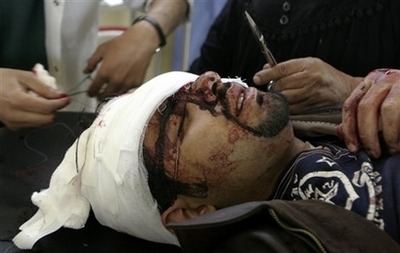Suicide bomb at Baghdad funeral kills 32
Updated: 2008-01-02 10:40
BAGHDAD -- A suicide attacker killed at least 32 men gathered in eastern Baghdad Tuesday to mourn the death of a retired Iraqi army officer, a Shiite who was slain last week in a car bombing blamed on al-Qaida in Iraq.
|
|
The attack was a reminder of the dangers that persist despite Baghdad's recent decline in violence and of the peril for any mass gathering in a country where the bereaved often find themselves targets.
In a New Year's message from London, where he flew last week for what his office described as routine medical tests, Prime Minister Nouri al-Maliki said that "we witnessed sorrow and pain in 2007, but with the effort and brotherhood of Iraqis as well their insistence to wake up, the year ended with victories and successes."
He added that he hoped 2008 will "further boost national unity and cooperation" among Iraq's political parties, sects and ethnic groups.
The government, which has sought to reconcile Iraq's often warring Shiites and Sunnis, took a tiny step toward national reconciliation by sending a draft amnesty bill to the parliament speaker Tuesday. But the bill drafted by the Shiite-dominated government falls far short of Sunni demands. It covers less than a quarter of those held in Iraqi prisons, and none of those held by the American military.
Government spokesman Ali al-Dabbagh said the draft bill would also exclude those imprisoned for a variety of crimes ranging from terrorism, kidnapping and rape to antiquities smuggling, adultery and homosexuality. It also excludes senior figures of the former Baath regime.
If passed in its current form, the bill could see some 5,000 prisoners released, al-Dabbagh said. The Iraqi government has about 20,000 people in custody, while the US military holds about 25,000.
Sunni parliamentarians have criticized the bill for its limited scope. They have argued that most prisoners are charged with terrorist crimes, rendering it ineffective. Some also fear referring the bill to Iraq's gridlocked parliament will actually delay prisoner releases.
In Tuesday's bombing the east Baghdad neighborhood of Zayouna, a mixed Shiite and Sunni district, a man loaded with explosives walked into a funeral tent outside the home of Nabil Hussein Jassim, a retired army officer killed along with another 13 people in a car bombing in downtown Baghdad's Tayaran Square on Friday.
All 32 people killed by the suicide bomber were men, police and ambulance officials said on condition of anonymity because they were not authorized to release details of the bombing. The attack resembled those carried out by al-Qaida in past years, when men in suicide vests targeted funeral tents or processions. Tents are usually erected outside the homes of those whose died or outside mosques and are usually filled with male friends and relatives of the deceased.
It was the fourth large bombing to target Iraqi civilians or members of the predominantly Sunni tribal movement known as Awakening Councils in the past 10 days. A suicide bomber targeting members of the US-funded movement killed 12 people on Monday in Tarmiyah, just north of Baghdad.
The groups have been credited with helping slash violence across the country by 60 percent since June. The other key contributors were an inflow of 30,000 additional US troops and a cease-fire called by radical Shiite cleric Muqtada al-Sadr.
In other violence Tuesday, eight bullet-riddled bodies were found around Iraq. Separately, the bodies of a Sunni policeman and four of his relatives were found in a village north of Baghdad hours after gunmen abducted them from their home.
Iraq's government released statistics on the number of civilians and security force members it said were killed in 2007.
According to figures released Monday by the Iraqi government, 16,232 civilians, 432 soldiers and about 1,300 Iraqi policeman died in 2007. The previous year, according to the figures compiled by the health, defense and interior ministries, 12,371 civilians, 603 soldiers and 1,224 policeman were killed.
The government's figures were roughly in line with a count kept by The Associated Press, which found that 18,610 Iraqis were killed in 2007. In 2006, the only other full year an AP count has been tallied, 13,813 died.
For December 2006, the count found that 2,309 people were killed compared to about 700 last month. Last January was equally blood-soaked with 1,908 deaths.
The AP count -- which includes civilians, government officials, police and security forces -- is compiled from hospital, police and military officials, as well as accounts from reporters and photographers. Insurgent deaths were not included. Other counts differ and some have given higher civilian death tolls.
Also Tuesday, the US military announced the death of an American soldier the day before from a non-combat injury. The soldier's name was withheld until family could be notified.
|
|
|
||
|
||
|
|
|
|
